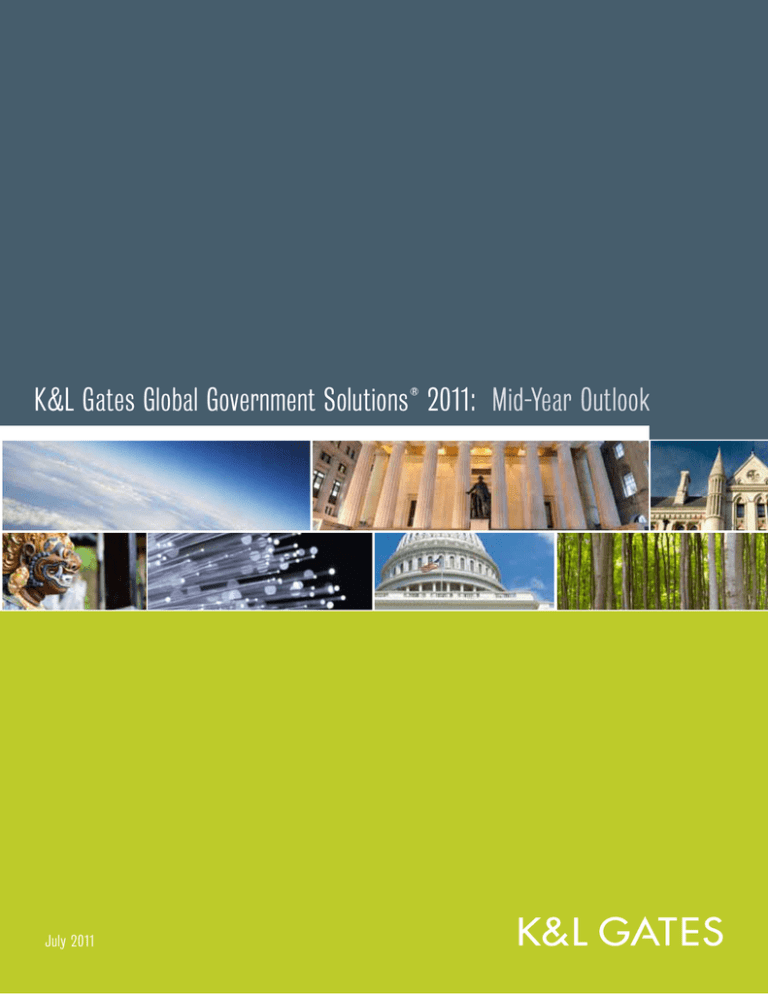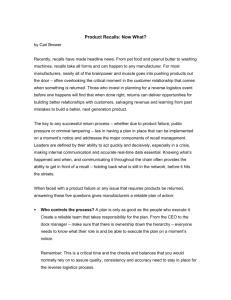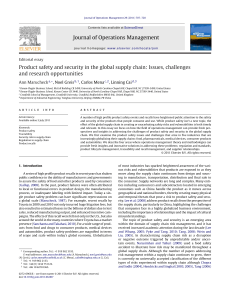
K&L Gates Global Government Solutions ® 2011: Mid-Year Outlook
July 2011
Health Care, TMT, and FDA
Food Recalls: The Changing Policy Environment
Until recently, the basic elements of a food product recall within the United States
have remained essentially unchanged for decades. First, information surfaces
indicating that a particular food item available in the marketplace may pose a
meaningful risk to the public health. Then the manufacturer, in cooperation with
government regulators, takes action to notify the public of the threat and take
effective measures to remove the product from the stream of commerce.
In recent years, however, a variety of
legal, scientific, and other developments
have begun to significantly alter this
environment. Perhaps the most highly
publicized is the recent determination by
the U.S. Congress, through enactment of
the Food Safety Modernization Act earlier
this year, to provide the Food and Drug
Administration (“FDA”) for the first time
with the authority to actually mandate
that a manufacturer must take certain
action to effect a recall. But there may
be less here than meets the eye. In point
of fact, while the process has historically
remained voluntary, companies routinely
have taken these sorts of actions on their
own initiative. Moreover, whenever the
government requests that a manufacturer
or other private party do so, cooperation
has essentially been universal.
This willingness to act reflects a general
commitment to corporate responsibility,
74
albeit mixed with a considerable measure
of realism. Even in a situation where the
basis for such a government request might
be debatable, the company involved is
simply not in a position to be at odds
with the government and risk creating the
public perception that it is insufficiently
concerned about the health and welfare
of its customers. Given this reality, it is
not surprising that the FDA has already
indicated that it intends to exercise its
new-found authority only under the rarest
of circumstances. It is also not surprising
that the FDA’s companion agency in the
food safety arena, USDA’s Food Safety
Inspection Service (which has jurisdiction
over all meat and poultry items), has
indicated that it has no particular interest
in seeking a similar grant of authority.
Of considerably more importance
are continuing advances in science
and technology, such as enhanced
K&L Gates Global Government Solutions ® 2011 Mid-Year Outlook
detection methods. In addition, today’s
recalls, particularly when potential
microbiological contaminants such as
salmonella and listeria are involved, are
increasingly based upon epidemiological
evidence as opposed to data
connecting a particular manufacturer
to a contaminated food product. In
such circumstances, regulators, in
coordination with state and federal
public health officials, increasingly rely
upon epidemiological tools such as food
consumption surveys to request recalls
and issue related public health warnings
based upon statistical assumptions
about which foods are causing the
problem. And while epidemiology is a
legitimate science, it cannot purport to
be an exact one. Take, for example, the
effective devastation of the tomato crop
in 2008, based upon public warnings
of contaminated tomatoes driven by
such data. Several months later, FDA
got around to announcing that tomatoes
were not in fact part of the problem; cold
comfort to those growers affected.
In addition, today’s public health officials
now use readily available techniques,
such as establishing an active intranet
to rapidly share information and quickly
Health Care, TMT, and FDA
Until recently, the basic elements of a food product recall within the United States have remained essentially unchanged for decades.
drive recommendations to regulatory
bodies who in turn take action and inform
the public. Within such a system it is often
the case that the most aggressive, riskaverse voices are the loudest and meet
with little resistance.
The communications landscape
surrounding recalls is shifting in other
fundamental ways. Not too long
ago a press release was virtually the
only meaningful tool for getting out a
recall message. Depending upon the
significance of the issue and other factors,
such releases could generate additional
publicity through newspapers, television
and other media. But as in so many
other areas, the internet, blogosphere,
and social media have upended the
established order. Of particular note
here are the so-called “mommy blogs”
that monitor such developments with
an extremely high level of concern and
influence. Any manufacturer that finds
itself in the middle of a significant recall
and does not monitor the electronic
dialogue is probably making a
significant error—an error, it should be
emphasized, that is not being made by
today’s plaintiff’s bar, which has become
increasingly aggressive and opportunistic
within the food safety and recall arena.
Insurance issues are also in flux.
Dedicated recall insurance policies or
riders are a relatively new development
and are becoming increasingly popular,
but conflict and confusion are emerging
here as well. Food manufacturers that
have purchased this sort of protection
and find themselves facing recalls tend
to logically assume that well-documented
claims will be paid with little controversy.
However, the increasingly speculative
process that drives many recalls, noted
above, is having an impact here as well.
In some instances, carriers have simply
insisted that, without direct and tangible
proof of product contamination, there is
no basis for recovery.
Food manufacturers have long
recognized that, given the unavoidable
potential for product recalls, they need
to have effective plans in place. As this
article suggests, however, today such
plans need to go beyond questions of
logistics, recordkeeping and distribution,
and provide for a comprehensive legal,
scientific, and communications strategy
as well. In this climate of significant and
rapid change, a manufacturer’s plan that
did a good job of contemplating and
addressing food recall issues two years
ago is already probably obsolete.
Robert G. Hibbert (Washington, D.C.)
robert.hibbert@klgates.com
K&L Gates Global Government Solutions ® 2011 Mid-Year Outlook
75
Anchorage Austin Beijing Berlin Boston Brussels Charlotte Chicago Dallas Dubai Fort Worth Frankfurt Harrisburg Hong Kong London
Los Angeles
San Diego
Miami
Moscow
San Francisco
Newark
Seattle
New York
Shanghai
Orange County
Singapore
Palo Alto
Paris
Spokane/Coeur d’Alene
Pittsburgh
Taipei
Tokyo
Portland
Raleigh
Research Triangle Park
Warsaw Washington, D.C.
K&L Gates includes lawyers practicing out of 37 offices located in North America, Europe, Asia and the Middle
East, and represents numerous GLOBAL 500, FORTUNE 100, and FTSE 100 corporations, in addition to growth
and middle market companies, entrepreneurs, capital market participants and public sector entities. For more
information about K&L Gates or its locations and registrations, visit www.klgates.com.
This publication is for informational purposes and does not contain or convey legal advice. The information herein should not be used or relied upon in regard to
any particular facts or circumstances without first consulting a lawyer.
©2011 K&L Gates LLP. All Rights Reserved.






